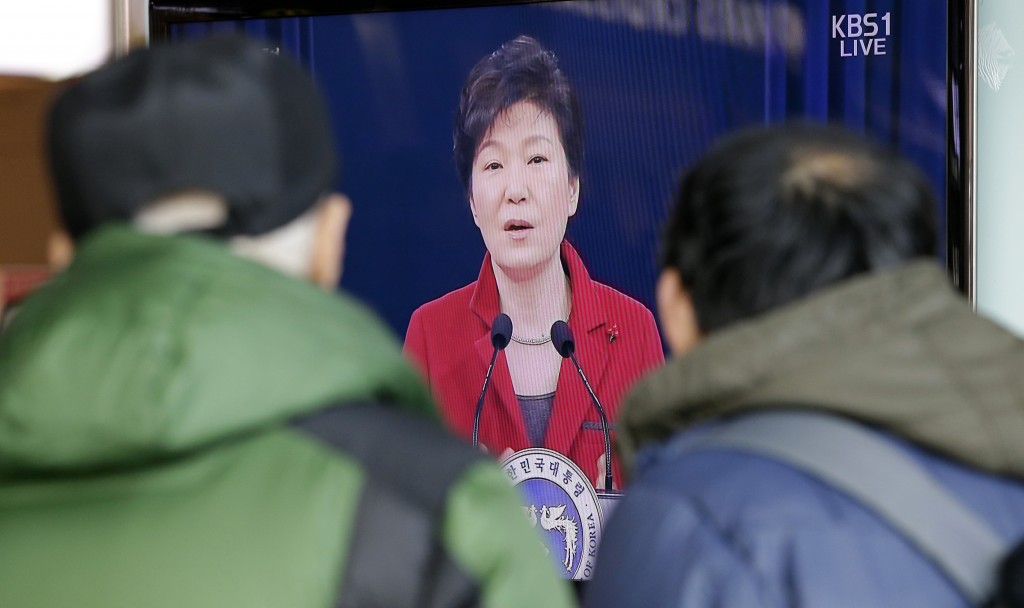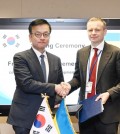- California Assembly OKs highest minimum wage in nation
- S. Korea unveils first graphic cigarette warnings
- US joins with South Korea, Japan in bid to deter North Korea
- LPGA golfer Chun In-gee finally back in action
- S. Korea won’t be top seed in final World Cup qualification round
- US men’s soccer misses 2nd straight Olympics
- US back on track in qualifying with 4-0 win over Guatemala
- High-intensity workout injuries spawn cottage industry
- CDC expands range of Zika mosquitoes into parts of Northeast
- Who knew? ‘The Walking Dead’ is helping families connect
Park enters 4th year in office

FILE – People watch a live television program airing South Korean President Park Geun-hye’s New Year’s press conference at the Seoul Railway Station in Seoul, Monday, an. 12, 2015. (AP file / Lee Jin-man)
By Kang Seung-woo
President Park Geun-hye has done well in dealing with diplomatic and security affairs during her three years in office, but has shown a disappointing performance in unifying the nation on contentious issues, analysts said Wednesday.
Park, who took office in 2013, enters the fourth year of her five-year single-term presidency on Thursday.
The President’s foreign policy was highlighted by “balanced diplomacy” between the United States and China, the nation’s two most important partners in terms of security and economics.
“Under the diplomatic initiative, President Park acted with balance,” said Park Won-gon, an international relations professor at Handong University.
“She attended the military parade marking the 70th anniversary of the end of World War II in Beijing and joined the China-led Asian Infrastructure Investment Bank (AIIB), while she also held summits with U.S. President Barack Obama to tighten the security alliance.”
Since her inauguration, Park has concentrated efforts on improving ties with China to take advantage of its leverage over North Korea as well as enhancing trade with its giant neighbor. As a result, the ties between the two nations have been described as the strongest ever.
The professor also gave credit to Park’s handling of inter-Korean tension in August due to Pyongyang’s landmine attack in the Demilitarized Zone (DMZ).
“The government’s consistent response led to North Korea’s rare concession to avoid a military confrontation. That has to be one of her major achievements,” he said.
A public poll also backs up Park Won-gon’s view, finding that more than half of all South Koreans estimate that her job performance in dealing with North Korea has been excellent.
According to a recent survey, conducted by Realmeter that interviewed 1,014 respondents, 54.8 percent of respondents supported the President’s North Korea policy and diplomatic efforts with neighboring countries, compared to 42 percent who opposed it. The poll’s margin of error was plus or minus 3.1 percentage points.
It was the only area of the poll where Park’s approval rating was higher than people’s disapproval, and hovered over the half-century mark. The poll also asked about her economic policy, national security and vision for the future, among others.
However, it remains to be seen if her approval rating will continue for the rest of her presidency because a rift between South Korea and China is emerging after the President’s decision to discuss with Washington deploying the U.S. Theater High Altitude Area Defense system (THAAD) to combat North Korea’s evolving nuclear and missile programs.
The Chinese government has repeatedly urged the South Korea to scrap the plan to deploy THAAD, warning the systems will jeopardize bilateral ties.
In addition, inter-Korean relations are returning to a confrontational mode with the South currently taking a hard-line on the Kim Jong-un regime due to the provocations, as evidenced by the shutdown of the Gaeseong Industrial Complex (GIC) earlier this month to cut off a major revenue source for North Korea’s advancement of its nuclear and missile programs.
How she deals with these issues will go a long way in deciding the success of her diplomatic and security efforts.
So far, President Park has failed to gain recognition in terms of forging national cohesion.
Political analysts advised the President to use her leadership to unify the nation.
“President Park has repeatedly shown unilateral leadership to freeze the political situation,” said Lee Jung-hee, a professor of political science at Hankuk University of Foreign Studies, in a media interview.
Kim Hyung-joon, a professor of political science at Myungji University, echoed Lee’s view.
“The key in politics is cohesion, but Park has been lacking in such efforts,” he said.
“For example, if the President wanted economic revitalization bills to be passed, she should have met with the opposition rather than the ruling party to seek cooperation.”
According to the poll, only 39.6 percent of respondents feel that President Park has contributed to unifying the nation, with 55.3 percent responding that she has not.















